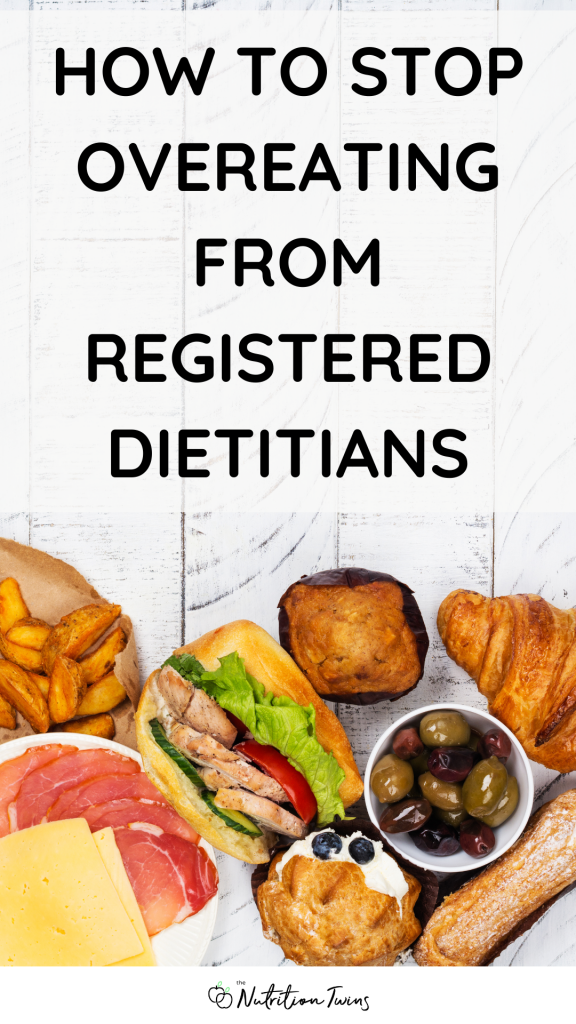
If you’ve ever dived into a sleeve of cookies or a bag of chips intending to eat just a few and find that you devour the whole thing, you want to know from us, registered dietitians, how to stop overeating.
We’re here to tell you that you can eat foods that you love while losing weight and avoid overeating with just a few good lifestyle and behavior techniques. And if you recently loosened the reigns on your eating and you’re struggling to reel it back in, these are great tips, to nip it in the bud.

While making sure that you’re not ravenous, rather already satisfied when you eat the foods that you tend to overeat is always an important first step, we’re starting with some tips you may not have tried before.
How can I stop overeating?
Often, when we overeat, we’re not fully aware or in the moment. In fact, typically we’re not truly enjoying the food that we overeat as much as we think.
This may seem surprising since we tend to overeat foods that we really enjoy. However, not only does science show this but for our clients and even for ourselves, we’ve noticed that at the times when overeating typically occurs, eating happens at a faster rate than it should.
Also, the bites are larger than they should be and the whole tasting experience isn’t fully realized because we “remember” that we like that food and that first taste is so delicious that we continue on. However, we need to reconnect our mind and body experience, and with a few steps– once we do that– it becomes much easier to eat less!
How does eating less become easier?
Once we allow our brain the chance to receive several signals from all over our body, not just from our stomach, we allow ourselves to truly feel how much we enjoy the food, slow down, and realize when we’d like to stop before feeling like we’ve overindulged and before feeling heavy and lousy.
This may sound strange if you haven’t tried anything like this before, but once you pay attention to each bite and enjoy it as much as you think you are, while also taking a few cues from your body, you’ll find it much easier to eat less.
How can you connect your brain and body to avoid overeating?
There are multiple things you can do to connect your body to your brain that help you to eat less. We’re sharing a few of our favorites. Note that most of these are ones that work well for us and our clients, however, we typically add others to help our clients really fine-tune their eating to avoid eating more than they’d like.
One of the most important things you can do to avoid overeating is…
Take time to enjoy your food. Most of us have a love affair with food, so act like it and romance it! No more slam bam, thank you ma’ams when it comes to eating your favorite foods (or doing anything for that matter 😉 ).
That’s rarely rewarding. But just like the best love affairs that are lasting and don’t come crashing down, you want the romance and it’s no exception here. And before you dive in and commit to a bad relationship that is a slippery slope to nowhere but feeling lousy, get to know your lover and decide if you want to go down that route.
This means getting to know your food in an intimate way and seeing how much you are truly enjoying it, so you know when to call it quits and how to make the most of it.
Here’s how:
- Take a piece of the food that you tend to overeat.*
- Take a long slow deep breath. (You may find it most helpful to do the breathing exercise below in combination with this).
- Bring the food up to your nose and slowly smell it.
- If it’s a food that you can break in half, break it, and smell it again.
- Take several deep breaths inhaling its aroma.
- Then take a SMALL bite and slowly chew it, gently swirl it around in your mouth letting the food be caressed by your tongue so that you allow each taste bud to enjoy it but do NOT swallow it.
- Notice the taste.
- What does it taste like?
- Notice the texture.
- How is the texture changing as you slowly chew it?
- How does the taste change?
- Once it is thoroughly chewed into a paste-like texture, take a deep breath and swallow it.
*For us, we choose a piece of chocolate.
**We always become highly aware of the chocolate melting and changing textures and the taste getting sweeter as we allow each taste bud to get its share. 🙂
How did you enjoy it?
Did you love it? Would you like another bite? Repeat this process until you’re satisfied. It’s CRITICAL to take your time and slowly enjoy each bite and practice at least one round of deep breathing between eating. (See below.)
Fun fact: We, The Nutrition Twins’ practice this with some of the foods we love most–like a piece of chocolate or our 5-Minute Microwave Chocolate Chip Cookies.
We’d practically inhale chocolate and peanut butter and likely overeat if we didn’t do the steps we’re sharing in this article. For us, deep breathing is also a huge help (and of course, making sure we’re eating right throughout the day so that our blood sugar isn’t setting us up to overeat is another big part).
If overeating or having a hard time controlling some (or all) foods is something you struggle with this, to get started, fill out this form here to see how we can help you with our 1:1 Counseling.)
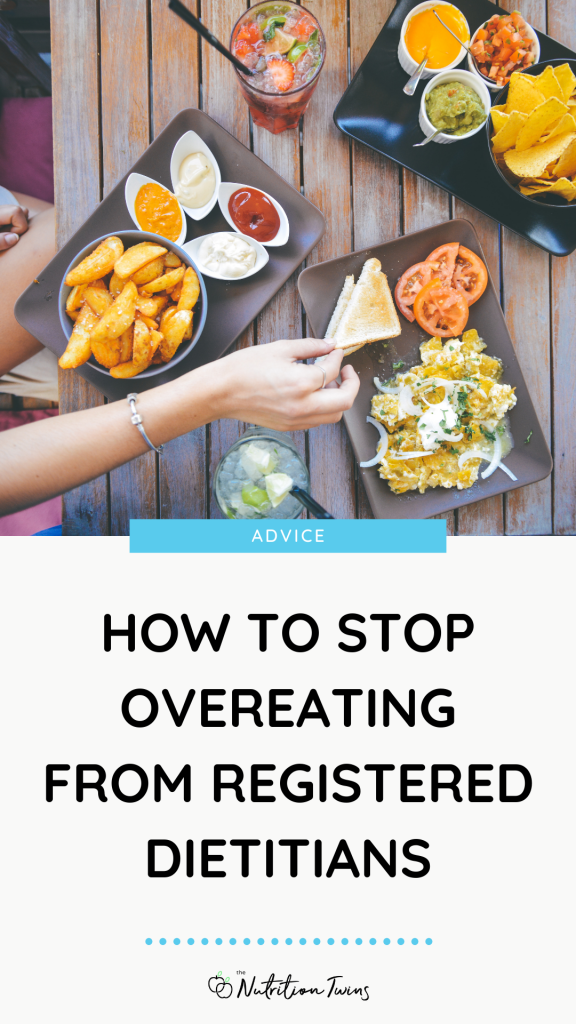
Does deep breathing help you to lose weight? Eat less?
It can! Deep breathing helps our clients (and us!) fight off cravings, eat less, reduce stress—and sleep better.
To be honest, it took us a bit of time practicing deep breathing first to help with our sleep before we started to use it regularly around our favorite foods. It just didn’t come to mind initially when we were eating our favorite foods.
But the more we used it in life, it started to come naturally when we were eating. And before indulging in foods that we tend to want to overeat, we do a few rounds of deep breathing, before, in the middle of, and after and the urge to overeat seems to fall by the wayside!
What are breathing exercises?
Breathing exercises are simply the practice of paying attention to your breathing while reducing outside distractions. There are different breathing techniques and we’ve found a few to be especially helpful for us and our clients. The cool thing about them is that research has shown them to have many health benefits such as lowering anxiety and stress (which often go hand in hand with overeating), decreasing inflammation, lowering arthritis pain, and improving sleep quality (poor sleep is also responsible for consuming excess calories and leading to weight gain), just to name a few.
They’ve also been shown to improve digestion by enhancing the movement of the belly and food in it (this is super helpful for fighting bloat!) and help you to feel fuller and fight off cravings. Breathing exercises have also been shown to help control emotional eating, increase metabolism, and help with weight loss!
How do you do breathing exercises?
We typically start by recommending deep breathing (but if you already have a breathing technique that works for you, use that one!). In this form of breathing, you slowly take a deep breath in through your nose, hold it in your lungs and then release it slowly through your mouth.
We typically recommend starting with the 4-7-8 count. Breathe in through your nose for 4 counts, hold it in your lungs for 7 counts and slowly breathe out through your mouth for 8 counts. That’s one set.
When we first started using this breathing technique, we used it to help us to fall asleep. Our goal was to complete 10 rounds and we rarely made it to ten before we’d fall asleep! Now it works like magic to help us to eat less—and for our clients too!
As we mentioned, before we even take a bite of foods that we love we take a deep breath in through our nose, and before we know it, the edge it taken off, we do a few rounds of deep breathing and we’re much more rational as we approach our favorite foods, and we also make sure we have good posture as we do it.
Does it matter what your posture is like if you want to stop overeating?
Yes! Your posture plays a large part in whether you overeat. First, taking a moment to acknowledge your posture will help you to connect your body and brain and take you out of that robotic/mindless overeating mode that often happens when we get hyper-focused on simply eating food that we remember that we love and overeat it.
To avoid overeating, good posture must be maintained throughout the entire eating experience. This means your ears should be aligned with your shoulders and your shoulder blades, also known as the “angel wings” should be retracted. Proper digestion only occurs when we’re sitting up straight.
If you’re slouched over, food can’t efficiently travel to the stomach to tell your brain that you’re getting full. In fact, it can take twice as long for your brain to get the signal that you’ve been fed, and you can eat a lot of food in that time– overeating and feeling heavy and bloated is much more likely.
Plus, studies show that gastric emptying is very delayed when in reclined position compared to sitting. If you don’t want to feel bloated after a meal, don’t forget about your posture!
How do Twists and Bends help you to boost your metabolism and eat less?
There’s a reason we have our clients do twists and bends in their chairs. Think to twist (as if you were turning to see someone behind you) and bend to the left or right (as if you were picking up a napkin that fell on the floor).
Twists and Bends help you to reconnect your body to your brain, helping you to be more in touch with your body and how it is feeling. It also makes autopilot eating (when most of us tend to overeat) much less likely. The little movements also keep your blood pumping and your metabolism working and aid your digestion, helping it to keep up with what you’re consuming. And while this makes us laugh—it’s true— you’ll also have less gas at the table! 🙂
The other cool thing about Twists and Bends is that they help us to realize when we’re full and that alone can help to keep the portions in check. After all, many of us realize we’re full only after we’ve overeaten. But if you practice Twists and Bends, you’ll likely be aware that you don’t need as much food, helping to keep you in check!
Does the size of your eating utensil help you to eat less?
We find it can be super helpful for us and our clients! As girls who love frozen desserts, like frozen yogurt, we particularly are fans of demitasse spoons for foods that we know we could easily overeat.
This spoon is really small– smaller than a teaspoon! Just using it makes us slow down and not shovel dessert in at the pace that we could with a larger spoon and it helps us and our clients to eat less!
It also helps to keep us at the moment and aware. If you tend to overeat foods that you eat with a fork, buy a baby fork (really!!) and try using that! We say anything that works, is worth it! Of course, we also use the steps above that we shared, as well as many other tactics.
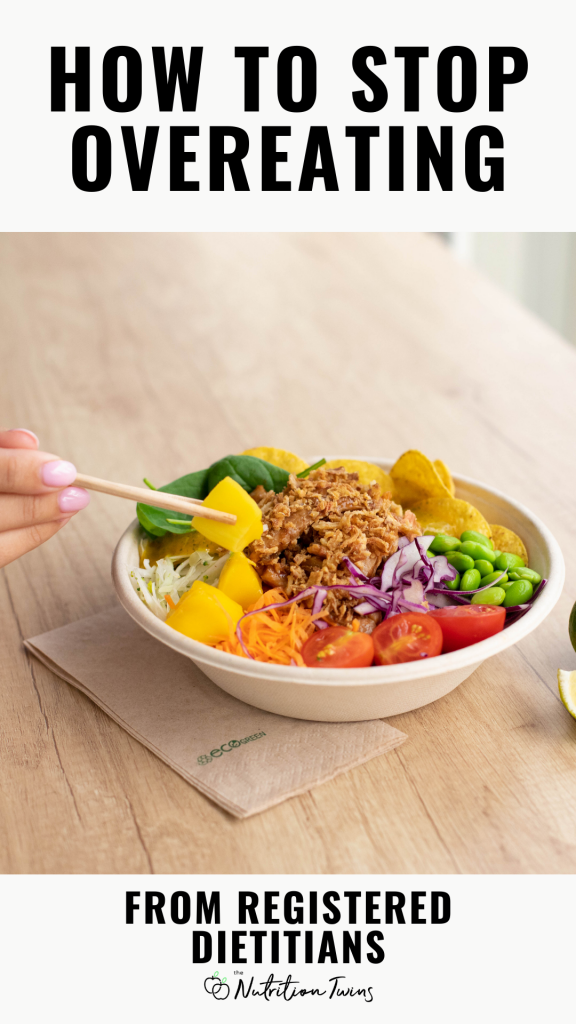
In summary
While there are so many other techniques that we use to help our clients to eat less, it’s important to start with just a few. Like this, you will not feel overwhelmed with options to try.
To recap, to prevent overindulging, it’s important to maintain stable blood sugar when you go to eat foods that you typically overeat. So you’ll want to make sure you’re making good meal choices. It’s best to face any food that you have trouble controlling the portion when you already feel satisfied.
When you indulge in foods that you tend to overeat, start by slowing down and taking time to enjoy your food. Follow the steps that we mentioned above to romance your food and in order to help to ensure you’re fully enjoying it.
These steps will also help you to slow down. Remember to practice deep breathing, eat only when you have good posture, do the seated bends and twists, and try using a demitasse spoon.
Do you have a friend who may benefit from this information? Share this link with them! https://nutritiontwins.com/how-to-stop-overeating-from-registered-dietitians/
If you’re struggling with overeating and you’re feeling like things are a little out of control, grab our 3 Simple Secrets to Lose Weight without Relying on Willpower.

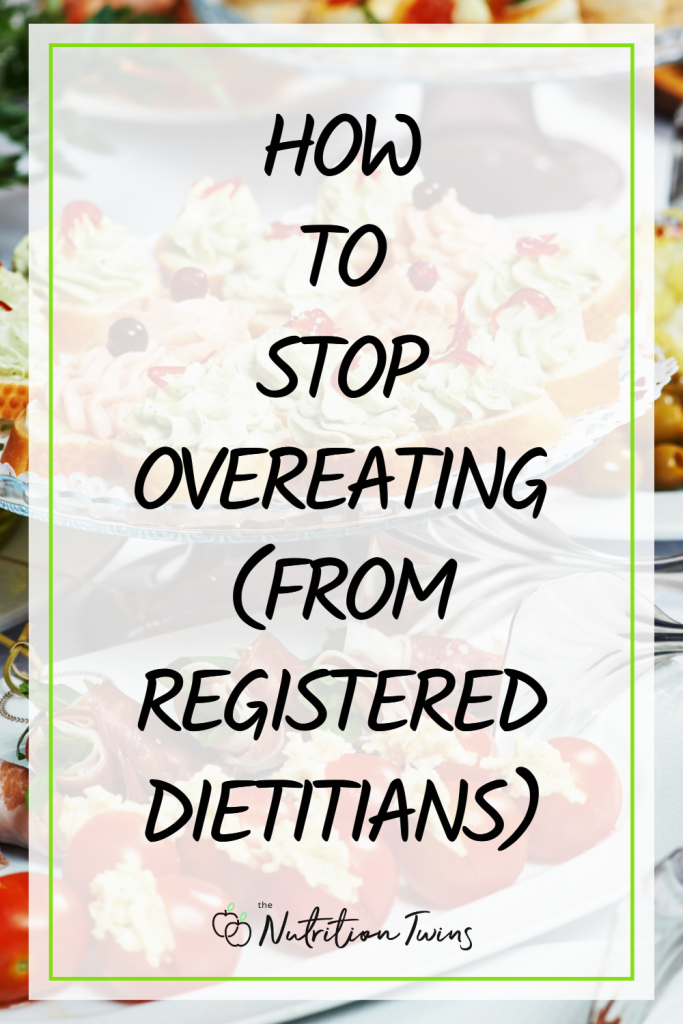
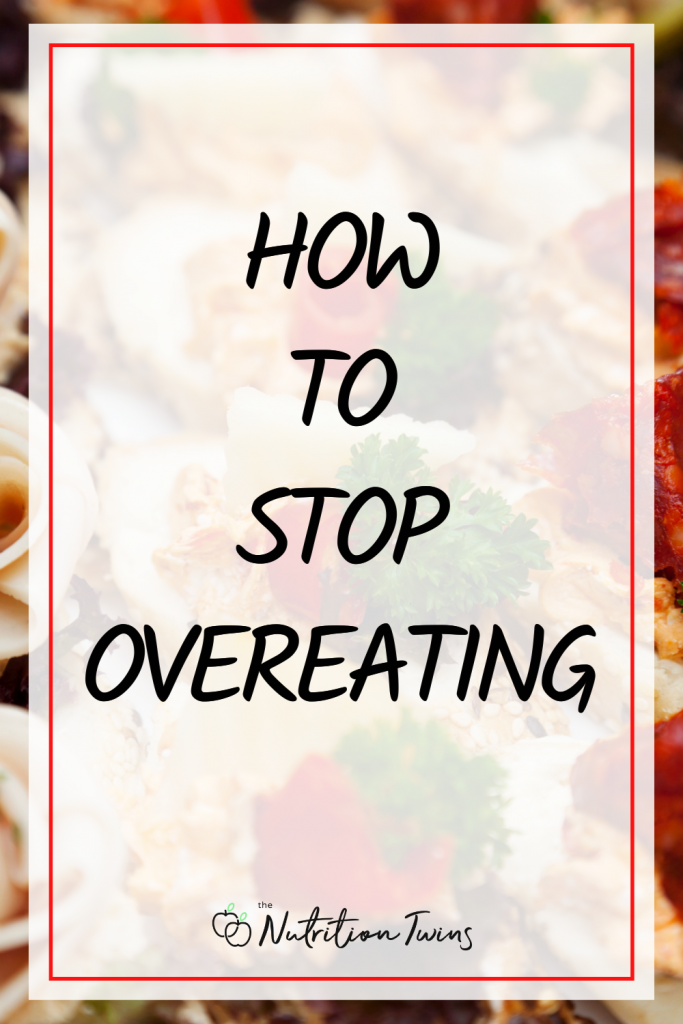


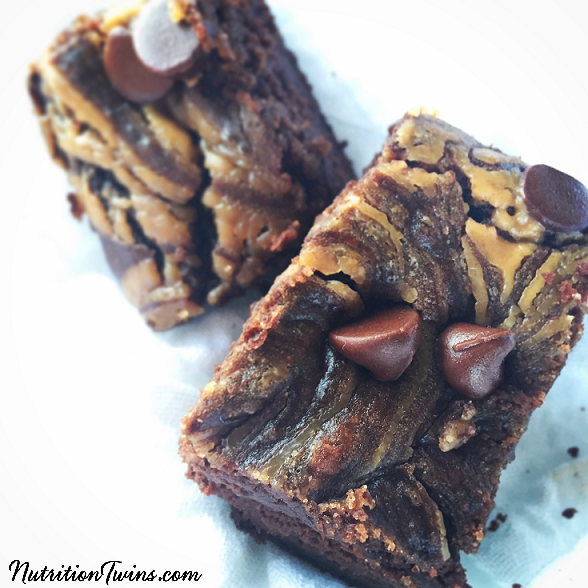
Thanks!
Our pleasure! Thanks for your grateful attitude Beverly! xoxo
These are fantastic pointers! Slowing down the eating process is great in so many respects, but I particularly like that it gets you through that 20-minute time period that it takes for your body to actually notice you’ve eaten and allow you to feel satisfied. Thanks much for all your great and helpful advice!
Thank you so much Elissa! We really appreciate your kind words! You are spot on about the 20-minute window! You have that down!! Thank you again! xoxo
Great article and ideas! Your strategies really work!